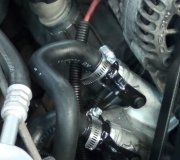You are referring to the miserable "interference" engine design of which this engine is not. Pop the water pump on and buzz off into the sunset.
To do a compression test, you would have to put the timing belt on and that means installing the water pump. Of course, if the old pump is just leaking and the bearings are okay, you could do the compression test first, but to be accurate, that should be done when the engine is still warm. It is too late for that now. Also, a battery charger should be connected so the last cylinder being tested is cranking just as fast as the first ones.
If you have reason to suspect a valve problem from a broken timing belt, a better test is a cylinder leakage test. A compression test will only tell you if the compression is low. A cylinder leakage test will tell you why. You may find a tester at an auto parts store that rents or borrows tools. Compressed air is pumped into the cylinder, through the tester, when the piston is at top dead center on the compression stroke, then you observe where it is sneaking out. If an exhaust valve is leaking, you will hear air hissing at the tail pipe. If an intake valve is leaking, you will hear the hissing at the throttle body. Leakage past the piston rings will be heard at the "oil" cap or dip stick tube. For a leaking cylinder head gasket, you will see a steady stream of tiny bubbles in the radiator, or you will hear hissing from an adjacent spark plug hole.
SPONSORED LINKS
Monday, December 11th, 2017 AT 3:08 PM




